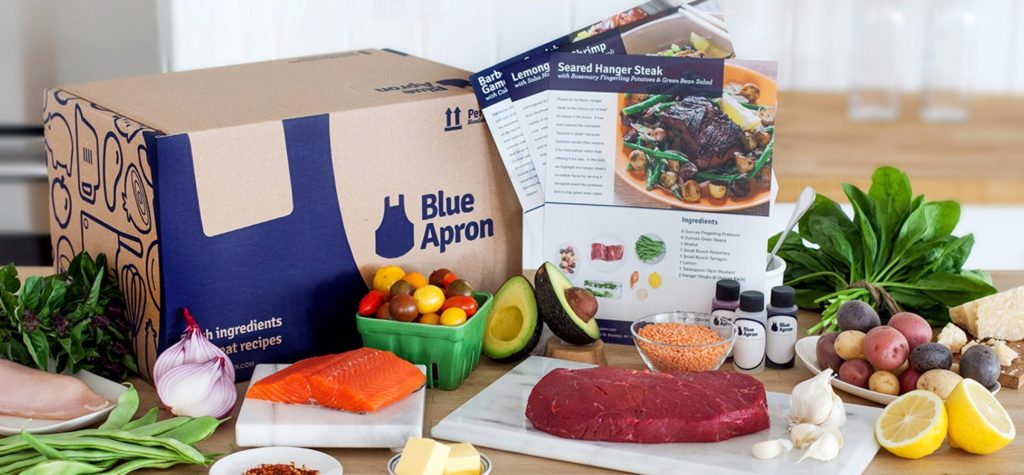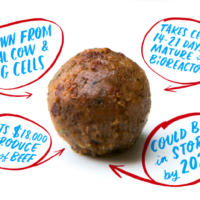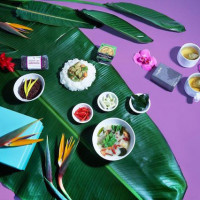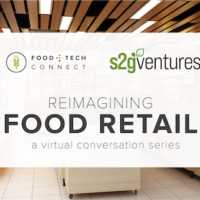
Every week we track the business, tech and investment trends in CPG, retail, restaurants, agriculture, cooking and health, so you don’t have to.
There’s a lot of activity in the food delivery and retail world. Meal delivery startups continue to struggle. Last week Sprig, a San-Francisco based, delivery-only restaurant with $56.7 million in funding, closed its doors. As Bloomberg reported last month, the company was burning through $850,000 per month and was seeking a buyer. The news came a week after David Chang-backed Maple had shuttered. Both companies learned the hard way that the logistics of producing and distributing great food on-demand and at scale is really, really difficult.
In other delivery news, meal kit startup Blue Apron filed for an IPO this week. The filing revealed just how expensive it is to maintain a successful meal-kit company. Blue Apron lost $54.8 million dollars in 2016, a 16 percent greater loss than the previous year it spent $144 million on marketing in 2016 and $60.6 million in the first quarter of 2017 alone. If the bid is successful, it will be the first in its space to go public.
In grocery news, Whole Foods has abandoned its model of ‘conscious capitalism,’ online grocery is the next frontier for American investors, and The Future Market is bringing its conceptual grocery store of 2042 to The Fancy Food Show in June.
Check out our weekly round-up of last week’s top food startup, tech and innovation news below or peruse the full newsletter here.
Our newsletter is the absolute easiest way to stay on top of the emerging sector, so sign up for it today and never miss the latest food tech and innovation news and trends, Already signed up? Share the love with your friends and colleagues!
_______________
1. Explore the Future of Grocery Shopping in NYC This Summer
Come visit The Future Market, a conceptual grocery store stocked with products from the year 2042, this June 25-27 at The Summer Fancy Food Show in NYC. Similar to concept cars at an auto show, you’ll get personalized shopping experience and see 21 concept food products
2. Packaging Food With Food to Reduce Waste – The New York Times
A growing number of entrepreneurs and researchers are working to turn foods like mushrooms, kelp, milk, and tomato peels into edible replacements for plastics, coatings and other packaging materials.
3. Blue Apron Just Revealed How Expensive it is to Help America Cook – Quartz
Blue Apron’s IPO filing revealed that the company lost $54.8M is 2016, a 16% greater loss than the previous year. Food, packaging and shipping made up the bulk of Blue Apron’s expenses but marketing also weighed in heavily.
4. A Eulogy for the Golden Era of VC-Subsidized Meals, Which is Finally Over – Quartz
Sprig, the startup that had raised $56.7M to cook and deliver its own meals, has shut-down. Meal delivery companies that relied on coupons and promotional offers to lure customers are shutting down after failing to retain consumers who refuse to pay for delivery.
5. Chef’d CEO: ‘Our Customer Acquisition Costs are About a Tenth of What the Competitive Set is Paying’ – Food Navigator
Thanks to its unique partnership model, wider selection and no subscription fees, customer acquisition costs at meal kit startup Chef’d are significantly lower than rivals, says founder and CEO Kyle Ransford.
6. Why Online Grocery Shopping Can be the Next Big Opportunity for Investors – The Motley Fool
Analyst David Kretzmann explains why online grocery is one of the technology trends where the U.S. market is lagging, and if we catch up to countries like the U.K. or South Korea, there is a long path for growth ahead.
7. Whole Foods Represents the Failures of ‘Conscious Capitalism’ – The Guardian
Facing a crisis of competition from behemoth retailers such as Kroger, Safeway and Target, Whole Foods is now prioritizing a centralized bulk-buying strategy that looks a lot like the model its competitors.
8. How the Trendiest Grilled Venture Got Burnt – Backchannel
The Melt, a fast-casual grilled cheese chain created by a Silicon Valley tech founder, had cash, technology, and some of Silicon Valley’s finest minds — yet it failed to disrupt the humble sandwich.
9. Kimbal Musk Says Food is the New Internet – The Wall Street Journal
Former tech entrepreneur Kimbal Musk’s ambitions for innovation in sustainable farming are as grand as his brother Elon’s for space travel and electric cars.
10. Robots Wielding Water Knives are the Future of Agriculture – Wired
In California, where farms are facing a serious labor shortage, workers are working in tandem with sophisticated robots that fill physically demanding jobs that humans can’t do.





